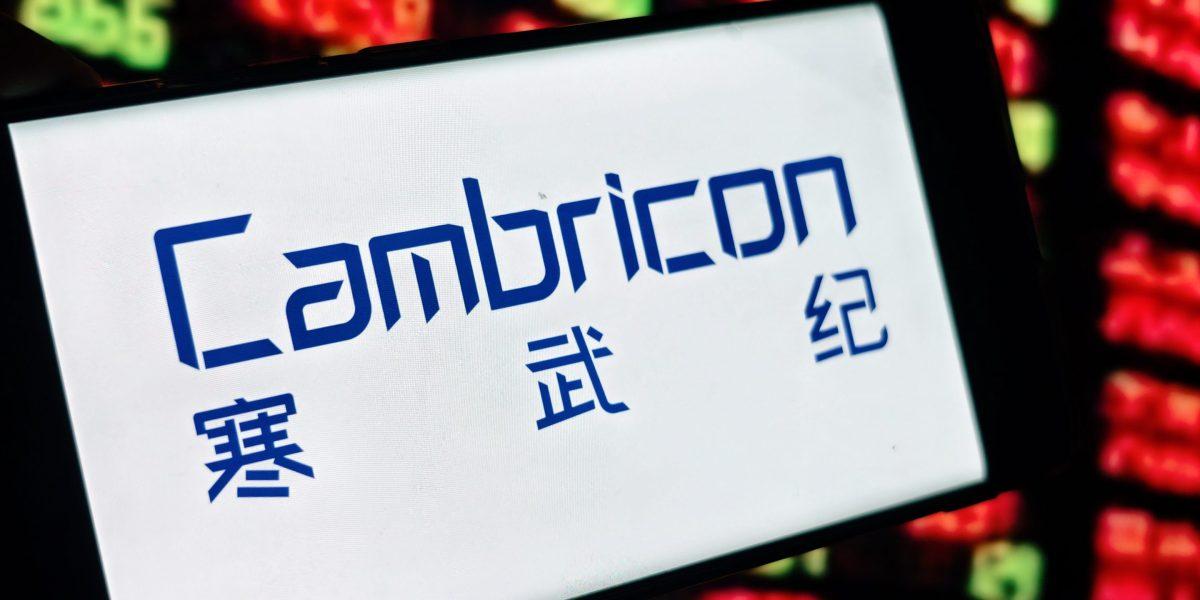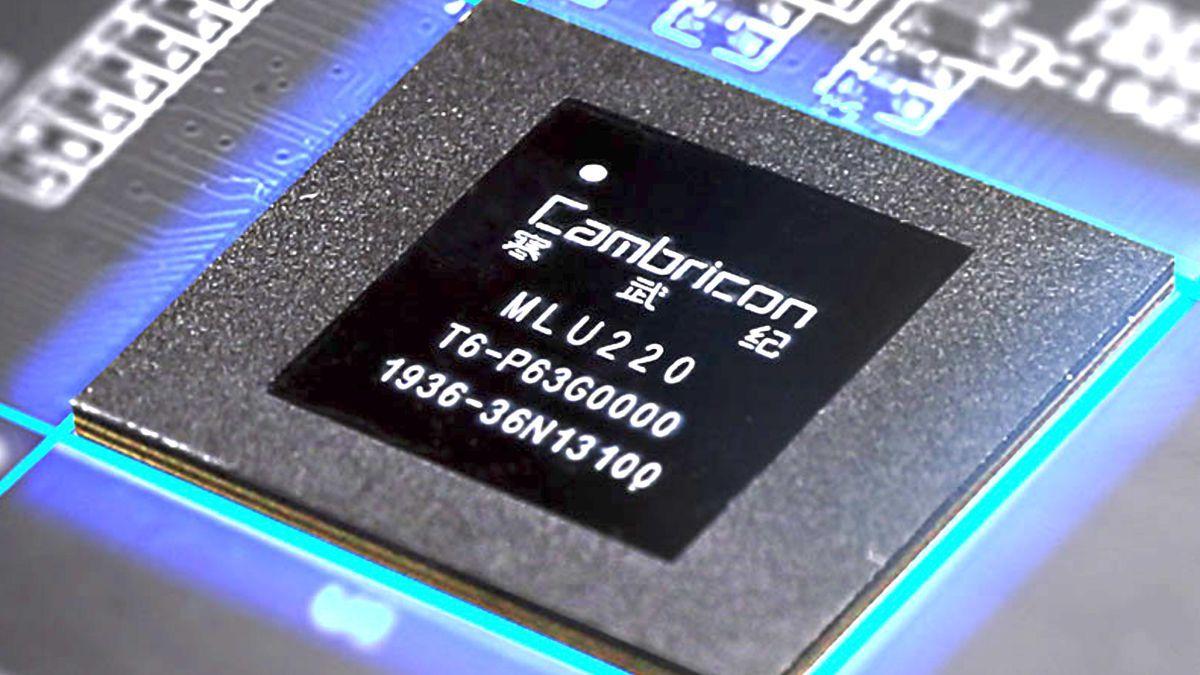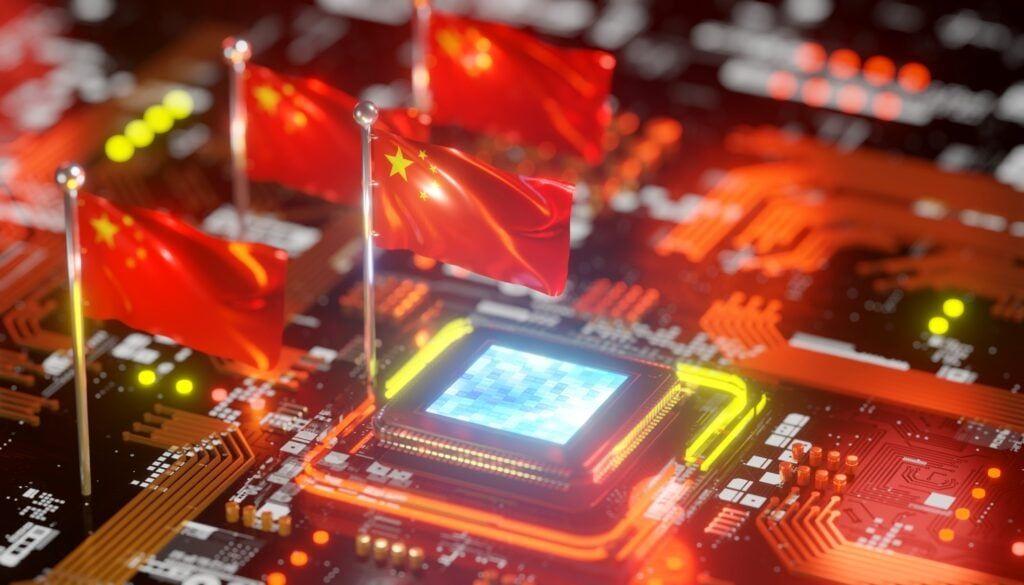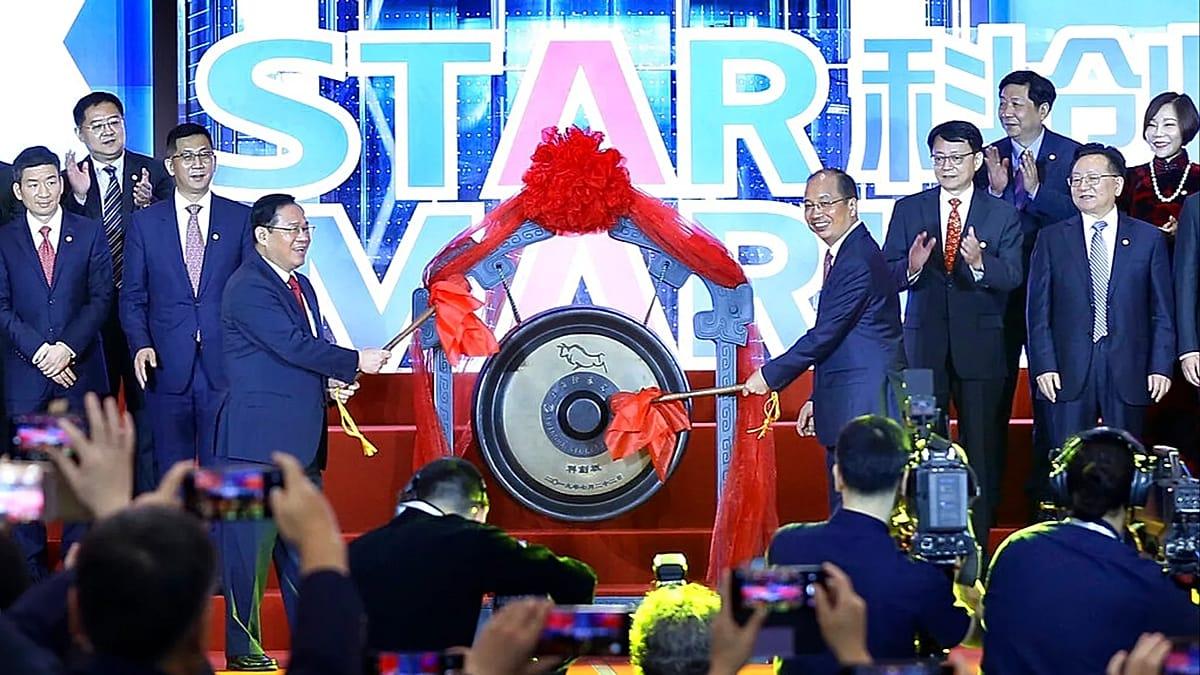Cambricon's Record Profits Highlight China's AI Chip Ambitions Amid US Restrictions
10 Sources
10 Sources
[1]
China AI Chip Leader Warns of Trading Risks After Stock Frenzy
Chinese artificial intelligence chipmaker Cambricon Technologies Corp. issued a warning to investors about elevated trading risks after its shares more than doubled in one month. Shares of the Shanghai-listed Cambricon, the biggest publicly traded designer of the chips that underpin AI development in China, have surged 134% since July 28 -- nearly 17 times the 7.9% increase in the benchmark CSI 300 Index in the same period -- as investors doubled down on innovative technology firms to keep driving a broader rally in the stock market. The chipmaker closed up 16% on Thursday at 1,587.91 yuan.
[2]
China's AI Chip Leader Cambricon Jumps 20% on Self-Reliance Bets
Cambricon Technologies Corp., China's best-performing stock in 2024, has more than doubled from a July low as momentum builds around the country's push for semiconductor self-sufficiency. Shares of the AI chip maker soared as much as 20% on Friday, fueled by a report that Nvidia Corp. had asked suppliers to halt production related to its H20 chips. That intensified investor bets on Chinese AI chipmakers that would be expected to serve as alternative suppliers. The Shanghai-listed stock has gained about 125% since the July 10 low, making it the top performer on the benchmark CSI 300 index in the period.
[3]
Chinese AI chipmaker Cambricon posts record profit
Chinese AI chipmaker Cambricon posted a record profit in the first half of the year, as it benefits from a surge in demand from companies including ByteDance for domestically made semiconductors to replace Nvidia's chips. The Beijing-based company on Tuesday reported a Rmb1bn ($140mn) profit in the first six months, compared with a loss of Rmb533mn the previous year. It recorded revenues of Rmb2.9bn, a 44-fold rise from 2024. Cambricon's share price has doubled in the past month, pushing its market capitalisation to Rmb580bn, after Chinese AI company DeepSeek unveiled an updated model compatible with domestically made chips. Its stock rose by 5 per cent on Wednesday to Rmb1,391, as investors bet that Cambricon would benefit from Beijing's push to support the local AI chip ecosystem. Beijing has instructed major AI firms, including the large internet companies ByteDance and Tencent, to reduce their dependence on Nvidia's technology. The majority of Chinese AI labs rely on the US tech giant for training large language models, but are increasingly using rival local chips for inference -- the process of using the models for tasks such as generating responses to chatbot inquiries. Cambricon is a small player in comparison to Huawei, its main rival in developing AI chips for China. It holds an estimated 3 per cent of the Chinese AI chip market, according to analysis by Bernstein, in part due to its limited fabrication capacity. Cambricon stated in its results that it has improved its inference software platform, enabling customers to run AI models more easily on its chips. The company is now seeking to raise up to Rmb4bn in a follow-on stock offering to fund investment in its AI chips and software for LLM training. Lin Qingyuan, a semiconductor analyst at Bernstein, wrote in a note to clients that Cambricon was the "best alternative to Huawei". "We continue to see Cambricon's commercial momentum significantly improve, as the addressable market for China AI fabless continues to ramp up post-DeepSeek and the ban on Nvidia chips," he wrote.
[4]
China Nvidia rival Cambricon adds to $40 billion rally with 4,000% revenue jump
China is focusing on large language models in the artificial intelligence space. Chinese semiconductor firm Cambricon posted record profit in the first half of the year underscoring how local challengers to Nvidia are gaining traction as Beijing looks to boost its domestic industry. Cambricon is among a plethora of companies in China that are vying to be an alternative to American giant Nvidia when it comes to providing the chips required to train and run artificial intelligence applications and models. In the first half of the year, Cambricon said revenue surged more than 4,000% year-on-year to 2.88 billion Chinese yuan ($402.7 million) and net profit hit a record 1.04 billion yuan. The numbers remain small when compared to Nvidia which reported $44 billion of revenue in its February to April quarter. The tech giant is due to report its fiscal second-quarter earnings later today. Still, Cambricon's surge in revenue highlights how tech companies in China are searching for potential alternatives to Nvidia, given the continuous threat that they could be cut off from American technology. Nvidia was blocked earlier this year from selling its pared back H20 chip to China. It has since been allowed to resume exports to China but must share 15% of its revenue from sales to the country with the U.S government.
[5]
China AI chip leader Cambricon sees record earnings boost from DeepSeek
Cambricon Technologies Corp. swung to a record profit in the first half, reflecting a wave of demand for Chinese chips after Beijing encouraged the use of homegrown technology in a post-DeepSeek AI boom. The Chinese AI chip designer, which competes with Huawei Technologies Co. to provide accelerators for developing and hosting AI models, posted a 1.03 billion yuan profit ($144 million) versus a year-earlier loss of 533 million yuan. That's off a roughly 44-fold surge in revenue to 2.9 billion yuan. Its shares climbed more than 8% in Shanghai. The results underscore how startups and big tech firms like Alibaba Group Holding Ltd. are increasingly employing domestic alternatives to Nvidia Corp. as the pace of AI development intensifies. The Chinese authorities have urged local agencies to use homegrown chips, citing security concerns as well as persistent uncertainty over the Trump administration's export curbs. That's lifted sentiment toward chipmakers amid rising geopolitical tensions and supply chain disruptions. Cambricon -- one of the largest listed AI chip designers -- has doubled its market value to $80 billion this month alone. That's after becoming China's top performing stock of 2024, riding investor enthusiasm over government support for local tech. On Tuesday, the State Council reaffirmed support for AI adoption as well as the development of intelligent vehicles and robots -- all of which require AI processors. "Amid U.S. restrictions on China's AI sector, government support for leading domestic firms is essential to drive growth and replace imported chips," said Ma Cheng, chairman of Shenzhen Juze Investment Management Co. "Such protection is necessary, and Cambricon's growth is far from temporary." Chip shares have led gains in the recent China stock market boom as investors grow more optimistic about the country's AI prospects and DeepSeek's latest model update, which it said was tailored to work with next-generation homegrown AI chips. Despite the strong results, Cambricon acknowledged intensifying competition in the AI chip sector, with only Nvidia maintaining an absolute advantage in the market. That's as the US government allows Nvidia and Advanced Micro Devices Inc. to resume sales of certain lower-end chips to the country. To shore up its base, Cambricon said it's expanded support for DeepSeek, Alibaba's Qwen and Tencent Holdings Ltd.'s Hunyuan models. It also announced a 4 billion yuan private placement in July to fund its large-model chip platform.
[6]
Chinese AI Firm Earns 43 Times More Revenue In H1 2025 As Beijing Turns To Domestic AI Chips
This is not investment advice. The author has no position in any of the stocks mentioned. Wccftech.com has a disclosure and ethics policy. Chinese chip firm Cambricon's revenue has jumped by 43x as Beijing looks to reduce reliance on foreign chips and rely on domestic alternatives instead. Cambricon posted RMB2.9 billion in revenue in its latest fiscal year, which marked a significant jump over last year's figures. The firm's profit sat at RMB1 billion, which was a marked jump over the year-ago figures of RMB530 million. Cambricon enjoys a key role in China's domestic AI chip ecosystem as it is the number two player in the industry after Huawei, whose Ascend AI accelerators continued to be the top-performing domestic AI chips. Cambricon released its earnings report yesterday in China, with the data showing that the firm earned RMB2.88 billion in revenue during the year's first half. This marked a whopping 43x annual increase, while its profit of RMB1 billion marked a 2x jump from the year-ago loss of RMB530 million. Cambricon currently offers seven AI chips in its portfolio. The latest of these chips is the MLU690 which, according to unverified rumors, is currently in early stages of production. The second-tier product is the MLU590, while the latest products listed on the firm's website are the 370 series chips. According to reports on Chinese forums, the 590 chips are built on the 7-nanometer manufacturing process node, which makes it likely that SMIC is the one responsible for their production. However, TSMC might be involved as well since older chips are made through the Taiwanese firm's 7-nanometer process. Out of the RMB2.8 billion in revenue that Cambricon earned during the first half, 99.6% came through its cloud computing business. As a result, it is clear that AI-driven demand, stimulated by Beijing's aim of relying on domestic chips, is driving the firm's revenue. The Chinese firm also continues to aggressively invest in research and development, with its R&D spending being RMB456 million during the first half. The R&D spending accounted for 15.9% of the firm's operating revenue and marked a drop in the overall percentage of the operating revenue since Cambricon turned a profit. However, in absolute terms, the figure remained the same to indicate that the firm is continuing to aggressively invest in its future. Cambricon's earnings report comes after the firm revealed plans to raise RMB3.98 billion in funding to capitalize on the aggressive Chinese domestic demand for AI chips. The firm also turned a profit in its first quarter, through its RMB355 million in net income for a significant jump over Q1 2024's RMB227 million in profit. The firm earned RMB1.1 billion in revenue in Q1 for a whopping 4,230% jump. Cambricon's shares have gained 112% year-to-date, courtesy of a 94% jump since early August. Over the year, the stock is up by 462% to indicate the sudden surge in domestic demand of Chinese AI chips.
[7]
China's Cambricon Technologies Rallies on Surging AI Chip Demand
Cambricon Technologies' shares regained momentum, after the Chinese AI chip designer swung to a profit on soaring demand for AI chips amid China's chip-localization push. Shares of the Beijing-based company rose as much as 8.2% early Wednesday, notching an intraday record high of 1,438 yuan, equivalent to $201.04, following Tuesday's dip. After almost quintupling in 2024, its stock price has more than doubled so far this year. Cambricon has become the second-most-expensive stock in the mainland Chinese market, only trailing liquor maker Kweichow Moutai. Known as an Nvidia challenger in China, the chip maker has been riding on China's AI push amid increasingly fierce tech rivalry between the U.S. and China. Beijing is banking on Cambricon, along with other local chip designers like Huawei Technologies, to make homegrown advanced chips at a time when the U.S. is restricting chip exports to China. Cambricon's first-half revenue grew roughly 44 fold to 2.88 billion yuan, and it swung to a net profit of 1.04 billion yuan from a loss of 530 million yuan in the year-earlier period, it said late Tuesday. The chip maker attributed the revenue jump to rising demand for AI computing and its collaboration with leading AI model makers and internet companies. Cambricon's revenue and net profit were both much better than expected, Guosheng Securities said in a research note. With its second-quarter gross margin roughly stable from the first quarter, the company is expected to sustain its profitability in the coming quarters as revenue continues to grow, the analysts said. Goldman Sachs raised Cambricon's target price by 50% over the weekend on rising capital expenditure among Chinese cloud server platforms, China's chip-localization efforts and Cambricon's research & development investments. Chinese demand for AI inferencing has been rising after the launch of local foundation models such as DeepSeek, while domestic clients are diversifying their channels for obtaining chips amid tariff uncertainty and data-security concerns. DeepSeek said last week that its new model uses a new format designed for next-generation homegrown chips, suggesting China's latest breakthrough in AI hardware. Markets have speculated that DeepSeek's latest AI chip could come from Cambricon. Goldman Sachs expects Cambricon's AI chip shipments to grow to 2.1 million units in 2030 from around 143,000 units in 2025. "With the AI ??wave and the increasing chip localization, we are optimistic about the company's subsequent strong supply and demand," Guosheng analysts said.
[8]
Cambricon Technologies Warns of Trading Risks After Stock Surges
Chinese artificial intelligence chip maker Cambricon Technologies issued a warning about trading risks after a surge in its stock price over the past month. The company's stock price increase has exceeded most of its industry peers' and major indices, the Beijing-based company said in an exchange filing on late Thursday. "There is a risk that stock prices will deviate from current fundamentals," it added. Cambricon's Shanghai-listed stocks gained 134% over the past month and overtook Kweichow Moutai as China's most valuable stock on Thursday after roaring another 16% to close at 1,587.91 yuan. Cambricon's rise comes amid a broader market rally in China, with the benchmark Shanghai Composite Index gaining over 6% over the past month and notching a ten-year high earlier this month. China's AI push and drive to make chips locally have given the AI chip designer another push as domestic investors have shifted their focus to AI infrastructure names. Cambricon also clarified that it doesn't have plans to launch new products. China-based AI company DeepSeek said last week that its new model uses a new format designed for next-generation homegrown chips, suggesting a breakthrough in China's latest AI hardware. Markets have speculated that the latest AI chip could come from Cambricon. Cambricon expects its 2025 revenue to be between 5 billion yuan, equivalent to $701.2 million, and 7 billion yuan, after its first-half revenue grew roughly 44 fold to 2.88 billion yuan.
[9]
Cambricon Technologies Warns of Trading Risks After Stock Surges -- Update
Chinese artificial-intelligence chip maker Cambricon Technologies issued a warning about trading risks after a surge in its stock price over the past month. The company's stock gains have exceeded that of most of its industry peers and major indexes, the Beijing-based company said in an exchange filing late Thursday. There is a risk that the stock price may have deviated from current fundamentals, as its current price-to-earnings ratio is over 5000 times, far exceeding the industry level, the company said. Cambricon's Shanghai-listed stock fell 5.6% as of midday on Friday after the warning. Despite the decline, its shares have more than doubled over the past month and have overtaken liquor maker Kweichow Moutai as China's most valuable stock. Cambricon's rise comes amid a broader market rally in China, with the benchmark Shanghai Composite Index gaining over 6% over the past month and notching a 10-year high earlier this month. China's AI push and drive to make chips locally have given the AI chip designer another push as domestic investors shift their focus to AI infrastructure names. Another catalyst behind the stock's gains was Goldman Sachs raising its target price on Cambricon by 50% over the weekend to 1,835.00 yuan. Cambricon also clarified Thursday that it doesn't have plans to launch new products. Chinese demand for AI inferencing has been rising after the launch of local foundation models such as DeepSeek, while domestic clients are diversifying their channels for obtaining chips amid tariff uncertainty and data-security concerns. DeepSeek said last week that its new model uses a new format designed for next-generation homegrown chips, indicating a potential breakthrough in Chinese AI hardware. Markets have speculated that the latest AI chip could come from Cambricon. Cambricon expects its 2025 revenue to be between 5 billion yuan, equivalent to $701.2 million, and 7 billion yuan, after its first-half revenue grew roughly 44-fold to 2.88 billion yuan. Some analysts are cautious about the frenzy over Cambricon and China's ambition to produce AI chips at home. Cambricon, as a fabless chip maker, can't turn into TSMC, the world's largest contract chip maker overnight, said Morningstar analyst Phelix Lee. Meanwhile, SMIC, China's largest chip maker, still has very low yields in manufacturing advanced chips, Lee added.
[10]
Chinese Chip Stocks Get Boost From Made-in-China Hopes
Chinese semiconductor stocks are getting a boost from hopes that more of the chips used in China will be made locally. Shares of companies across the semiconductor supply chain were leading gains in Hong Kong and China on Friday. Analysts said the gains were helped by speculation that U.S. chipmaking powerhouse Nvidia could suspend production of its H20 chip in China, potentially opening space for Chinese firms to step in. In Hong Kong, shares of Semiconductor Manufacturing International Corp.-- China's largest contract chip maker--rose 11%. China's No. 2 foundry, Hua Hong Semiconductor, was up 17%. In Shanghai, Cambricon Technologies, seen as a challenger to Nvidia in the Chinese AI chip market, advanced 20%--the daily maximum permitted in Shanghai--as did Hygon Information Technology. The Information on Thursday reported that Nvidia had told some component suppliers to halt production of the H20 chips. "We constantly manage our supply chain to address market conditions," an Nvidia spokesperson said in response to a request for comment. In late July, Chinese regulators summoned Nvidia representatives to discuss alleged "backdoor" security risks around the H20 chips, according to an official notice. The Wall Street Journal reported that authorities have told Nvidia's biggest Chinese customers not to buy H20s until the U.S. company clears the review. The absence of H20 would create "a void for domestic chipmakers to fill," Morningstar analyst Phelix Lee said Friday. In that scenario, both foundries like SMIC and chip designers like Cambricon could get more support from Beijing given the urgency to replace the supply of advanced chips, Lee said. If demand is strong enough, then local fabs can ramp up capacity despite low yields, Bernstein analyst Qingyuan Lin said. The H20 chip is caught in the crosshairs of U.S.-China trade tensions and the broader technology rivalry. China has ramped up efforts toward local production in recent years, aiming to be self-reliant as the U.S. tightens restrictions on access to advanced tech, but analysts say it still needs Nvidia's chips until its own alternatives are available. The result of China's investigation into the "backdoor" issue could decide the H20's fate, said Lin at Bernstein. There's no guarantee that Chinese-made chips will work as well as Nvidia's, said Morningstar's Lee, likening the localization push as efforts to "brute forcing its way through" complex computations. Another possibility is that Nvidia will design a new chip that satisfies both the U.S. and China, said Lee. Nvidia's spokesperson said that "China won't rely on American chips for government operations, just like the U.S. government would not rely on chips from China." "However, allowing U.S. chips for beneficial commercial business use is good for everyone," the spokesperson added. Another tailwind for chip stocks Friday came from Chinese AI startup DeepSeek, analysts said. DeepSeek, which made waves with a breakthrough low-cost AI model earlier this year, hinted in a technical paper that the next generation of AI chips made by Chinese companies is coming soon. The company said that its latest large-language model uses a new format designed for next-gen homegrown chips. That seems to suggest that it will use more China-made chips for future model development, China Securities analysts said in a note.
Share
Share
Copy Link
Chinese AI chipmaker Cambricon Technologies Corp. reports record profits and a surge in stock value, reflecting China's push for semiconductor self-sufficiency and the growing demand for domestic AI chips.
Cambricon's Financial Surge
Cambricon Technologies Corp., a leading Chinese AI chipmaker, has reported unprecedented financial success in the first half of 2025. The company posted a record profit of 1.03 billion yuan ($144 million), a remarkable turnaround from its 533 million yuan loss in the previous year
3
5
. This success is underscored by a staggering 44-fold increase in revenue, reaching 2.9 billion yuan1
3
.
Source: Bloomberg
Stock Market Frenzy
The company's stock performance has been equally impressive. Cambricon's shares have more than doubled in value over the past month, surging by 134% since July 28, 2025
1
. This growth far outpaces the benchmark CSI 300 Index, which only saw a 7.9% increase during the same period. The stock's meteoric rise has propelled Cambricon's market capitalization to an astounding 580 billion yuan ($80 billion)3
5
.Driving Factors Behind Growth
Several key factors have contributed to Cambricon's explosive growth:
-
Domestic Demand: Chinese tech giants like ByteDance and Tencent are increasingly turning to domestic chip suppliers, driven by Beijing's push for technological self-reliance
3
. -
US Export Restrictions: Ongoing uncertainties surrounding US export curbs on advanced chips have accelerated China's efforts to develop homegrown alternatives
4
5
. -
DeepSeek Compatibility: The unveiling of an updated AI model by DeepSeek, compatible with domestically made chips, has further boosted investor confidence in Cambricon
3
.
China's AI Chip Landscape
Cambricon's success is emblematic of China's broader ambitions in the AI chip sector:
-
Government Support: The Chinese government has been actively encouraging the use of domestic technology, particularly in AI development
5
. -
Market Position: While still a relatively small player with an estimated 3% of the Chinese AI chip market, Cambricon is seen as a promising alternative to both Nvidia and domestic rival Huawei
3
. -
Future Investments: Cambricon is seeking to raise up to 4 billion yuan in a follow-on stock offering to fund further development of its AI chips and large language model (LLM) training software
3
5
.
Related Stories
Challenges and Competition
Despite its recent success, Cambricon faces significant challenges:
-
Intense Competition: The company acknowledges that competition in the AI chip sector is intensifying, with Nvidia still maintaining a significant advantage
5
. -
Scale Disparity: Cambricon's revenue, while growing rapidly, remains small compared to industry giants like Nvidia
4
. -
Fabrication Limitations: The company's growth potential is somewhat constrained by its limited chip fabrication capacity
3
.

Source: Wccftech
Global Context and Implications
Cambricon's rise occurs against a backdrop of increasing geopolitical tensions and technological competition between China and the United States:
-
US Export Controls: Recent restrictions on Nvidia's chip exports to China have created opportunities for domestic suppliers like Cambricon
4
. -
Technological Self-Reliance: China's push for semiconductor self-sufficiency is gaining momentum, with companies like Cambricon at the forefront of this effort
2
5
. -
Market Optimism: Investors are increasingly bullish on Chinese AI prospects, driving up valuations of companies in the sector
5
.
As Cambricon continues to expand its support for major Chinese AI models and invests in advanced chip platforms, it is poised to play a crucial role in China's evolving AI ecosystem. However, the company's long-term success will depend on its ability to innovate and compete on a global scale while navigating the complex geopolitical landscape of the semiconductor industry.

Source: Fortune
References
Summarized by
Navi
Related Stories
Cambricon Technologies plans to triple AI chip production to fill Nvidia void in China
04 Dec 2025•Technology

MetaX soars 700% as Chinese AI chips challenge Nvidia's dominance amid U.S. export restrictions
17 Dec 2025•Business and Economy

Moore Threads surges over 500% in blockbuster Shanghai IPO as China accelerates chip independence
05 Dec 2025•Business and Economy

Recent Highlights
1
ByteDance's Seedance 2.0 AI video generator triggers copyright infringement battle with Hollywood
Policy and Regulation

2
Demis Hassabis predicts AGI in 5-8 years, sees new golden era transforming medicine and science
Technology

3
Nvidia and Meta forge massive chip deal as computing power demands reshape AI infrastructure
Technology





